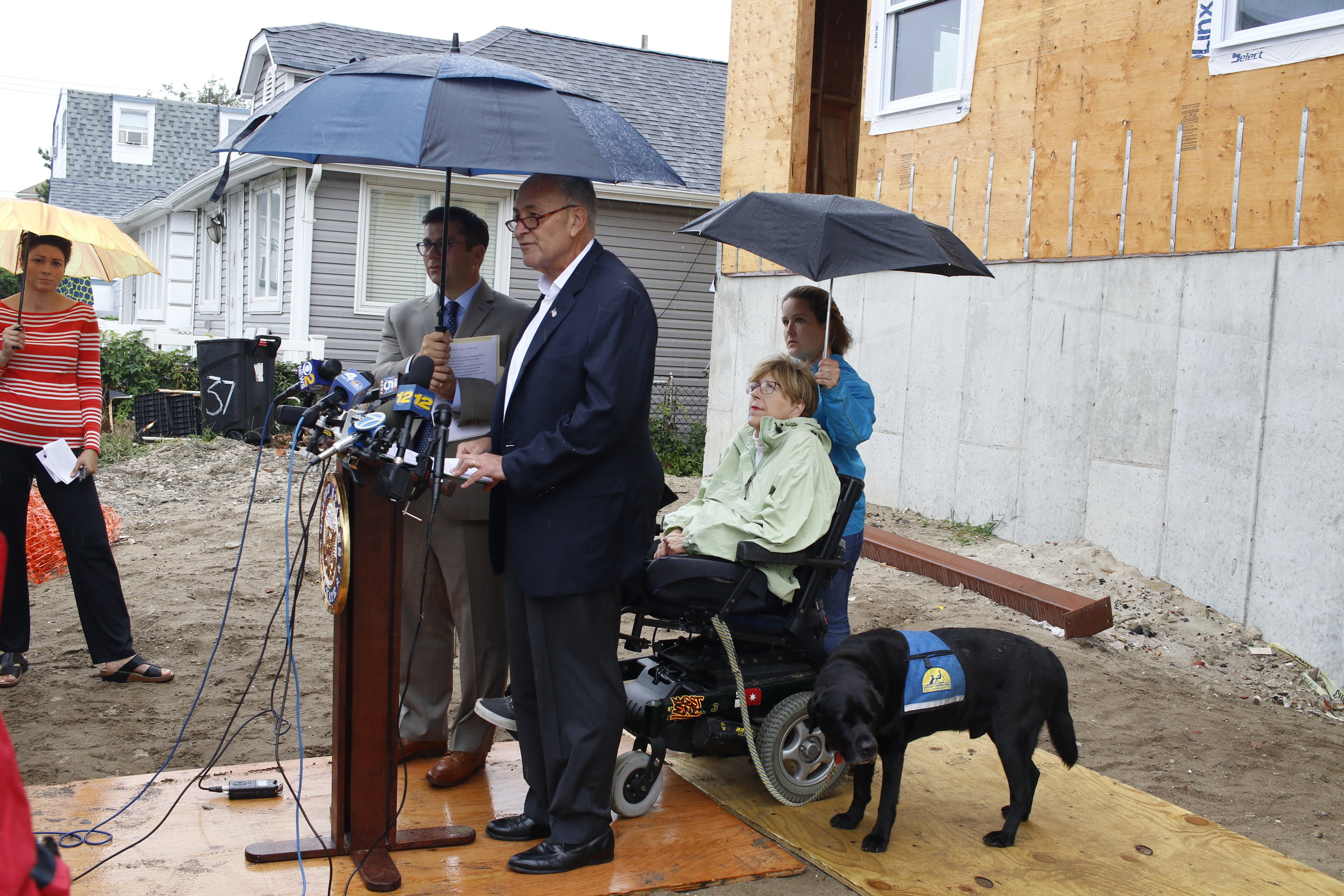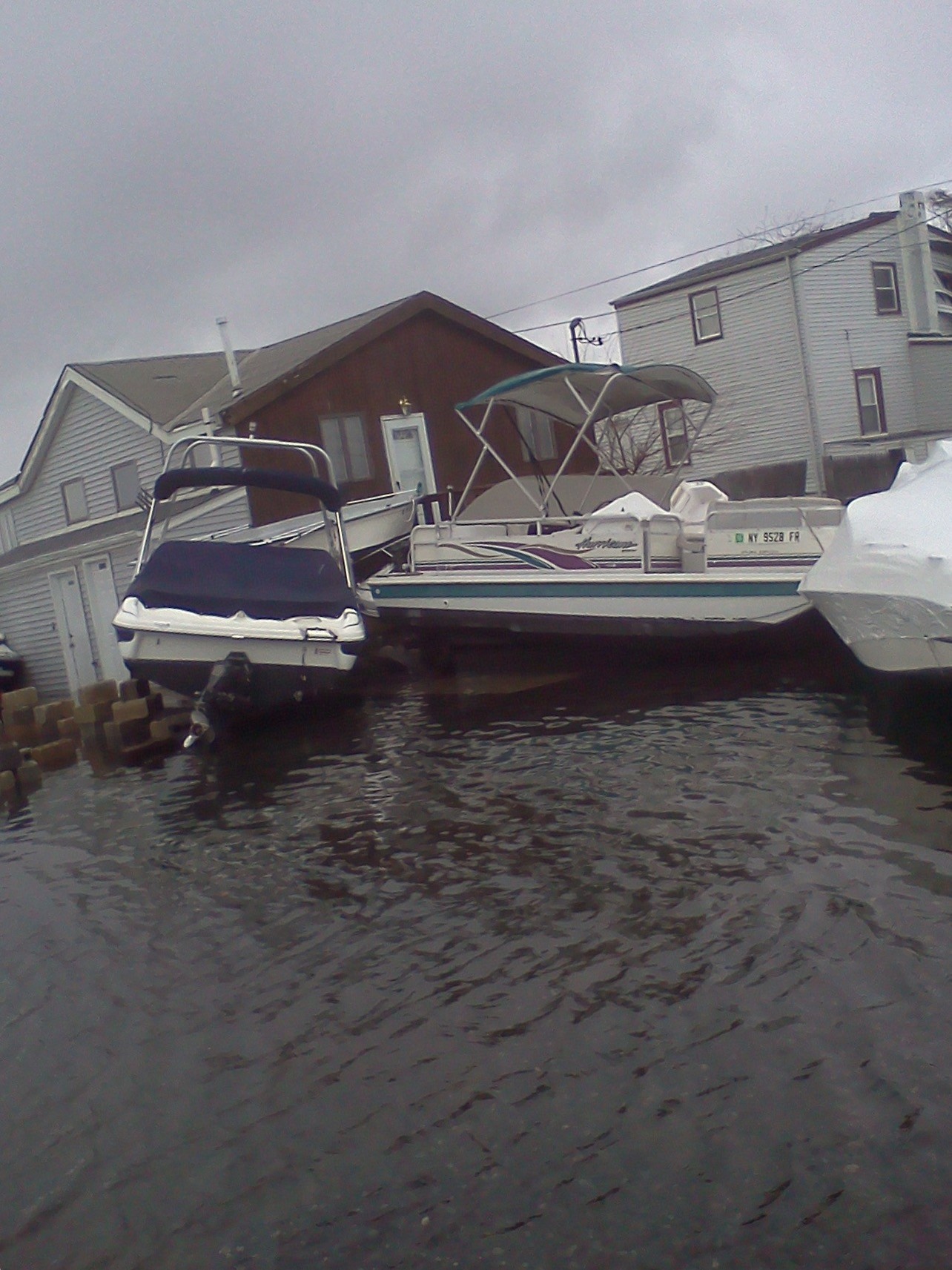Schumer calls on Congress to renew flood insurance program as Bay Park residents fear another Sandy
“We’re screwed, basically,” Bay Park resident Frank Ferraro said, as he watered the plants outside of his home at the east end of Waterview Street. Ferraro was referring to the expiration of the National Flood Insurance Program on Sept. 30, and the possibility that federal lawmakers will not renew it.
As he stood outside his home on a sunny afternoon on Aug. 31 — a day when the Waterview Marina, which is next to his house and flows into Mill River, was calm — Ferraro reflected on the day nearly five years earlier when that same river rushed into his home during Hurricane Sandy. He said that he and his fiancée, Mary SantoPietro, lived with a friend in East Rockaway for more than three months.
The TV images of flooding caused by Hurricane Harvey in Texas only increased Ferraro’s fear of another storm, he said. He noted that his flood insurance helped him get through Sandy. “What’s happening in Houston has me scared stiff,” he said, adding that he raised his home by eight feet after Sandy. “If they don’t renew it, it’s gonna force us to move, and I probably won’t be able to sell my house. It’s scary.”
On Aug. 29, as Harvey continued to batter Texas, U.S. Sen. Chuck Schumer called on federal lawmakers to renew the program, saying that, without it, flood-prone communities such as Bay Park could be in jeopardy.
Speaking at a news conference in Long Beach, in front of the unfinished home of Liz Treston — who, five years after Sandy is in the process of elevating her house — Schumer said that Congress’s failure to reauthorize funding for the program could leave Long Islanders vulnerable as this year’s hurricane season continues.
“For those of us here in New York and on Long Island, flashbacks of Sandy are made vivid by the torrent of Harvey,” Schumer said. “That is why ... as hurricane season itself continues to spin, we cannot and must not allow the National Flood Insurance Program to expire.”
East Rockaway Mayor Bruno Romano echoed Schumer’s sentiments, noting that many East Rockaway and Bay Park residents are still rebuilding long after Sandy. “The National Flood Insurance Program is vitally important to East Rockaway community homeowners,” Romano said. “It needs to be extended, and I support Senator Schumer’s efforts for our community on this urgent matter before the program expires. Village residents and neighbors in Bay Park can’t risk a lapse in the flood insurance coverage administered by the NFIP, especially as we still rebuild and recover from Sandy and Irene.”
The NFIP covers roughly 5 million policyholders nationwide, including tens of thousands on Long Island. The Federal Emergency Management Agency provides homeowners with flood insurance through the NFIP, which was established by Congress in 1968. Most private insurers have stopped offering flood policies, according to Schumer, who explained that companies could not charge premiums high enough to cover the costs of severe flood damage.
Harvey’s devastation has put a greater focus on the NFIP, and Congress is now debating its future, with Republicans pushing to restructure and partially privatize an industry subsidized by taxpayer dollars, according to The Washington Post.
Unless Congress acts to extend the program — which is more than $24 billion in debt after hurricanes Katrina and Sandy and other disasters — no new flood insurance policies can be written after Sept. 30. Schumer said that a lapse would mean uncertainty for people who purchase new homes, and for homeowners at risk of flood damage who would not be able to renew their coverage, among other concerns.
Schumer criticized House Financial Services Committee Chairman Jeb Hensarling (R-Texas), who has pushed for privatization and other changes, while lawmakers argue whether the program should be privatized or eliminated. Schumer said that while the program needs improvement, privatization would result in lower payouts to homeowners and create potential for fraud.
Hensarling “would rather end the program, as he has tried to do in the past, or [he] now wants to so greatly curtail it that prices for homeowners would go way up,” Schumer said. “The number of people who recovered would go way down, and people would be stuck. That is unbelievable. In the wake of what we experienced with Sandy, and Texas is experiencing with Harvey, we need to make flood insurance better and stronger, not undercut it, weaken it or even eliminate it. And we’re on the verge of that happening now.”
The NFIP required that homes with more than 50 percent damage from Sandy be elevated to base flood elevation, which varies from 8 to 17 feet above sea level. The rules, FEMA said, are intended to minimize flood losses.
Others who sustained less damage had the option to apply for funding through the New York Rising program to raise their homes — and also avoid hefty flood insurance premiums.
Schumer said that 144,000 homeowners in New York filed flood insurance claims after Sandy. Typically, flood insurance policies cover up to $300,000 in damage. If the national program were to expire, premiums for homeowners would significantly increase. Bay Park is prone to flooding, even in rainstorms, and many residents are concerned about what would happen without the program.
“I’m not happy about it,” said Patrick Kinneary, who lives on Waterview Street in Bay Park. The interior of his home, Kinneary said, still isn’t finished after being damaged by Sandy. He added that he had to elevate his house 7 feet.
Adela Magliocci, who lives at the corner of Compton Street and Fifth Avenue in Bay Park, has seen plenty of flooding in the area. She recounted that even though her home is about 15 feet off the ground, water still managed to flood her first floor during Sandy. “Water was coming so fast, and we looked outside and saw boats floating in the street,” Magliocci said. “All of a sudden, this place is an ocean.”
Schumer acknowledged that NFIP is not without its flaws, but emphasized that changes could be made. “We know the program is far from perfect,” he said. “We’re working to improve it to get the money earlier to people, to make sure the increases are not great, and to cover all the areas that have floods and not force people to pay in areas that don’t have floods.”









